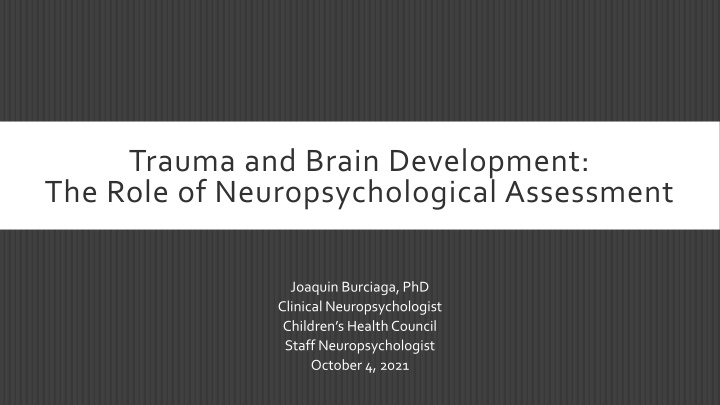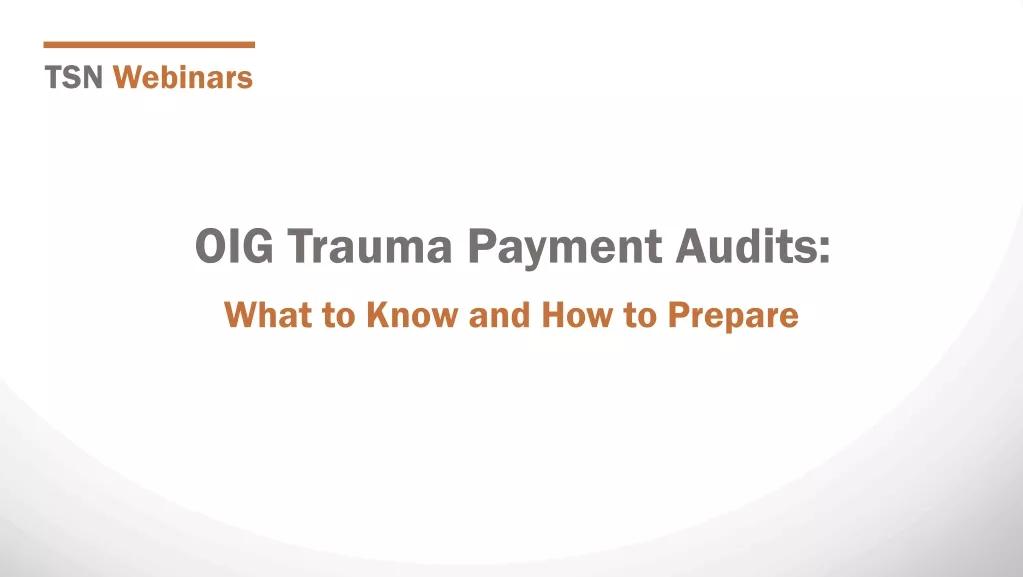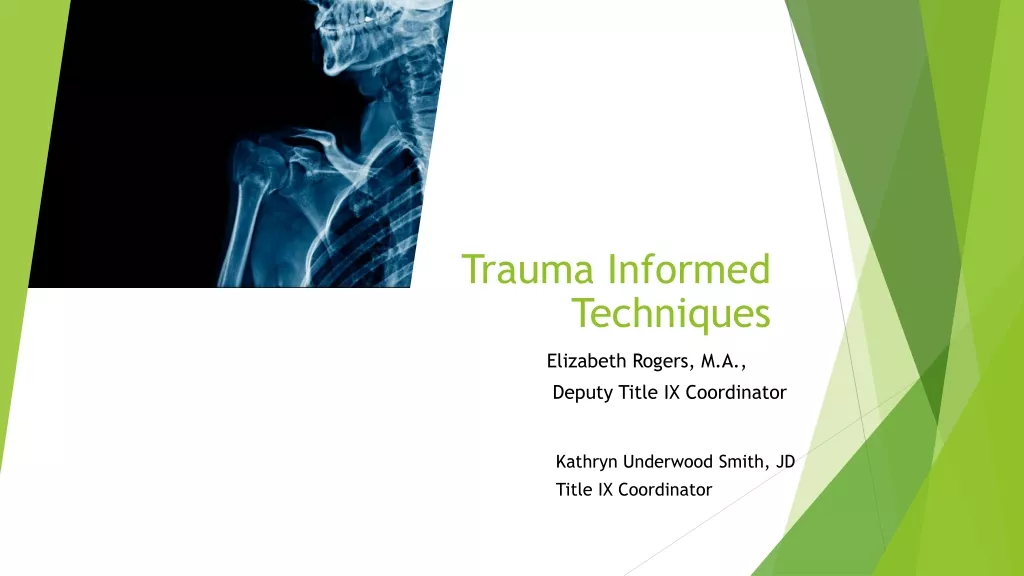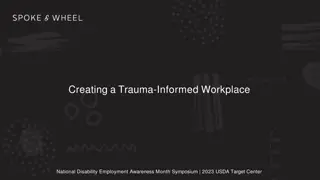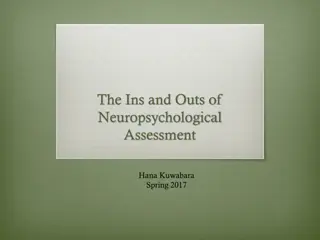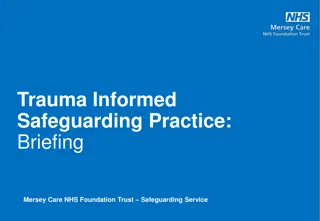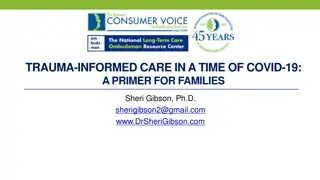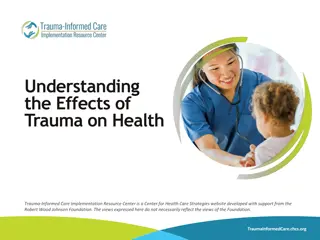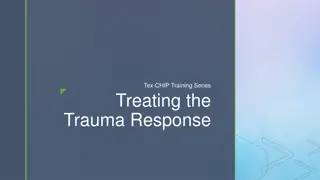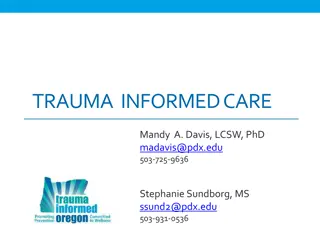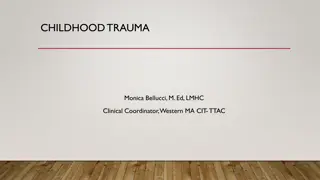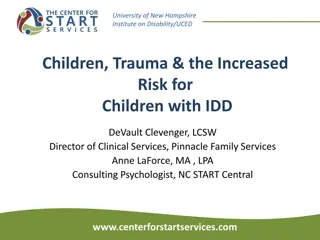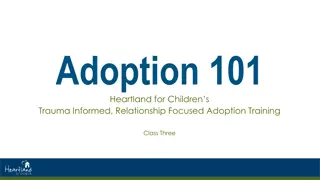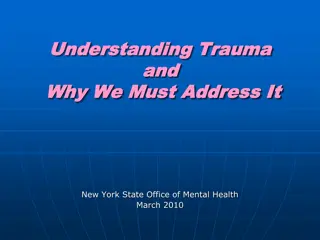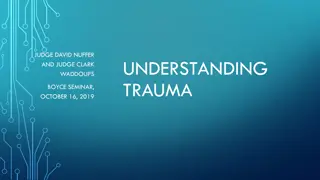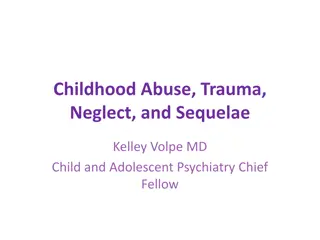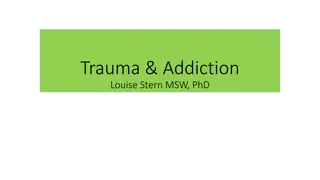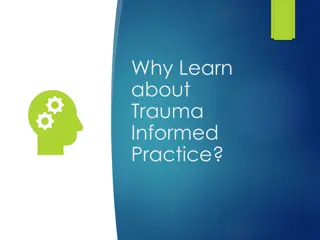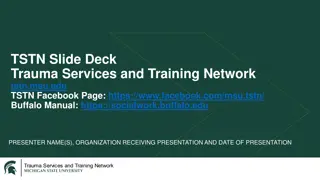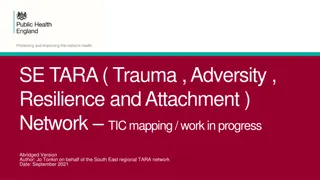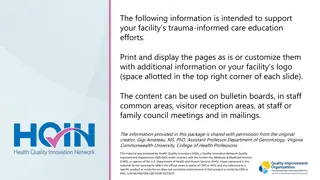Trauma and Brain Development: Role of Neuropsychological Assessment
Trauma in childhood can have lasting effects on brain development, impacting physical and mental health outcomes in adulthood. Adverse childhood experiences, including neglect, can lead to a variety of health complications such as depression, asthma, and heart disease. Neuropsychological assessment plays a crucial role in understanding and addressing the impact of trauma on brain function. This presentation explores the neuropathology of neglect and trauma, highlighting the importance of responsive caregiver relationships in promoting healthy brain development and social relationships.
Download Presentation

Please find below an Image/Link to download the presentation.
The content on the website is provided AS IS for your information and personal use only. It may not be sold, licensed, or shared on other websites without obtaining consent from the author.If you encounter any issues during the download, it is possible that the publisher has removed the file from their server.
You are allowed to download the files provided on this website for personal or commercial use, subject to the condition that they are used lawfully. All files are the property of their respective owners.
The content on the website is provided AS IS for your information and personal use only. It may not be sold, licensed, or shared on other websites without obtaining consent from the author.
E N D
Presentation Transcript
Trauma and Brain Development: The Role of Neuropsychological Assessment Joaquin Burciaga, PhD Clinical Neuropsychologist Children s Health Council Staff Neuropsychologist October 4, 2021
DISCLOSURES Information presented today does not represent the views of the Children s Health Council. Views expressed are my own. No Conflicts of Interest to disclose.
TRAUMATIC EVENTS IN CHILDHOOD Nearly two-thirds of all adults in the United States have at least one adverse childhood experience (ACE) More than 15% of adults have four or more. Women and people of color are more likely than other groups to have more adverse experiences.
IMPACTS OF TRAUMA ON HEALTH High Adverse Childhood Experience (ACE) scores are associated with greater risk of health complications: Depression Asthma Kidney diseases Stroke Heart disease Cancer Diabetes Greater propensity toward smoking and heavy drinking.
NEGLECT Child neglect may be the most pernicious form of child maltreatment Unfortunately it is also the most common form of child abuse Receives far less attention than physical, sexual, emotional abuse Types of Neglect and Differing Severities Emotional Neglect Physical Neglect Causes of Neglect Lack of resources (socioeconomic challenges) Lack of education regarding appropriate child care Parental Mental Illness Parental/Caregiver substance abuse
NEGLECT The developing brain relies on responsive/interactive relationships with care givers to make sense of the world It is a biological need that our brains are prepared to receive. A lack of response or reciprocity activates a stress or fear response Persistent neglect fails to provide the necessary input that the brain is relying upon to make connections between synapses and brain regions AND The stressor is also an activator of stress hormones/neurotransmitters leading to persistent stress and fear Persistent fear can distort how a child perceives and responds to threats Challenges differentiating between threat and safety Negative impact on social relationships Misinterpret neutral/ambiguous faces as angry or threatening Greater vulnerability to stress
NEUROPATHOLOGY OF NEGLECT AND TRAUMA
The Downstairs Brain1 Limbic regions Brain stem Life sustaining needs and Fight or Flight system The Upstairs Brain Cerebral Cortex Executive Functioning Calming Downstairs Brain Activated around age 2 (fully developed by mid 20s) Persistent early life neglect and trauma impacts the development of Upstairs Brain 1The Whole-Brain Child: 12 Revolutionary Strategies to Nurture Your Child's Developing Mind by Daniel J. Siegel and Tina Payne Bryson
NEUROPATHOLOGY OF NEGLECT/TRAUMA Neglect and trauma can have a profound impact on brain growth and development. 1997 Bruce D. Perry, MD, PhD
NEUROPSYCHOLOGICAL FUNCTIONING IN NEGLECT & TRAUMA
NEUROPSYCHOLOGICAL FUNCTIONING Challenges are not homogenous Attention and Concentration brief and sustained attention Executive Functioning. Working memory (being able to keep and use information over a short period of time) Inhibitory control (filtering thoughts and impulses) Cognitive or mental flexibility (adjusting to change in demand or perspectives) Planning and organization (prioritizing, tracking belongings/assignments) Intellectual functioning (decreased IQ) Verbal abilities most impacted Academic functioning Learning and memory both acquisition and retention of information
ADHD AND TRAUMA SYMPTOMS ADHD is common due to the effects of trauma on similar neural networks Both ADHD and PTSD can present with the following symptoms Concentration difficulty Inattentiveness related to ADHD Traumatic dissociation Executive dysfunction Hyperarousal Emotional sensitivity, reactivity, lability Sleep problems Depression Anxiety Reduced self-esteem
ADHD AND TRAUMA SYMPTOMS Stepping away from asking what is wrong with the child? to what happened in this child s life? Research examining ADHD symptoms and Adverse Childhood Experiences (ACE) found links between number of ACEs and ADHD severity (Brown et al. 2016). Higher prevalence of each type of ACE compared to children without ADHD Higher prevalence of socioeconomic hardships Parent divorce Family substance abuse Familial mental illness Neighborhood violence Domestic violence
ADHD AND TRAUMA SYMPTOMS Children with ACE score of 1 had higher odds of ADHD ACE score of 2, 3, and > 4 were significantly more likely to have parent-rated moderate to severe ADHD compared to children with no ACES Pediatric ACEs and Related Life Events Screener https://www.acesaware.org/learn-about-screening/screening-tools/
TREATMENT OF PTSD WITH ADHD MEDICATION Recent research has been examining the use of ADHD medication to treat PTSD symptoms Suggests interplay between same neural networks Treatment of ADHD symptoms with medication in children with trauma history may not necessarily cause any harm.
